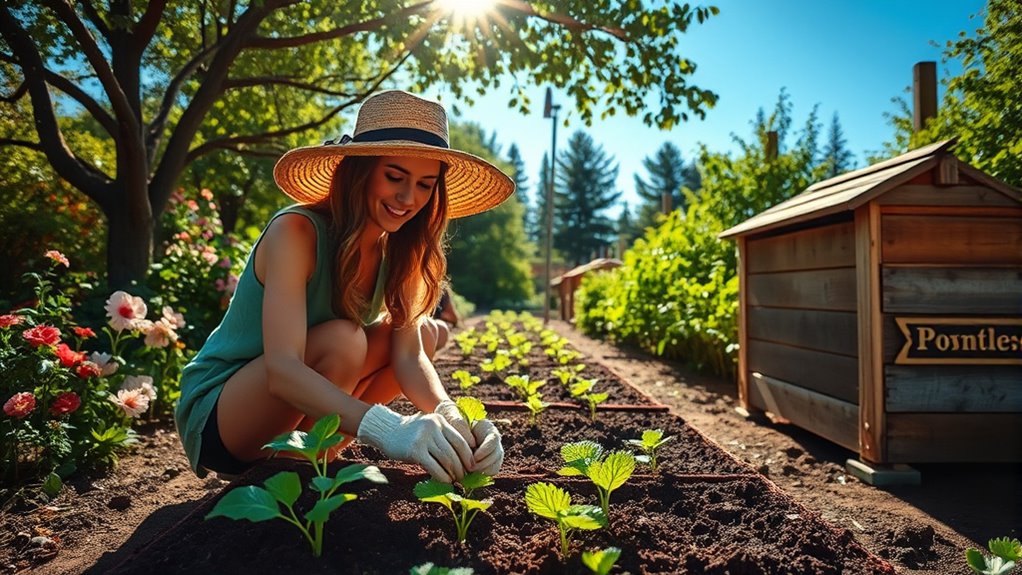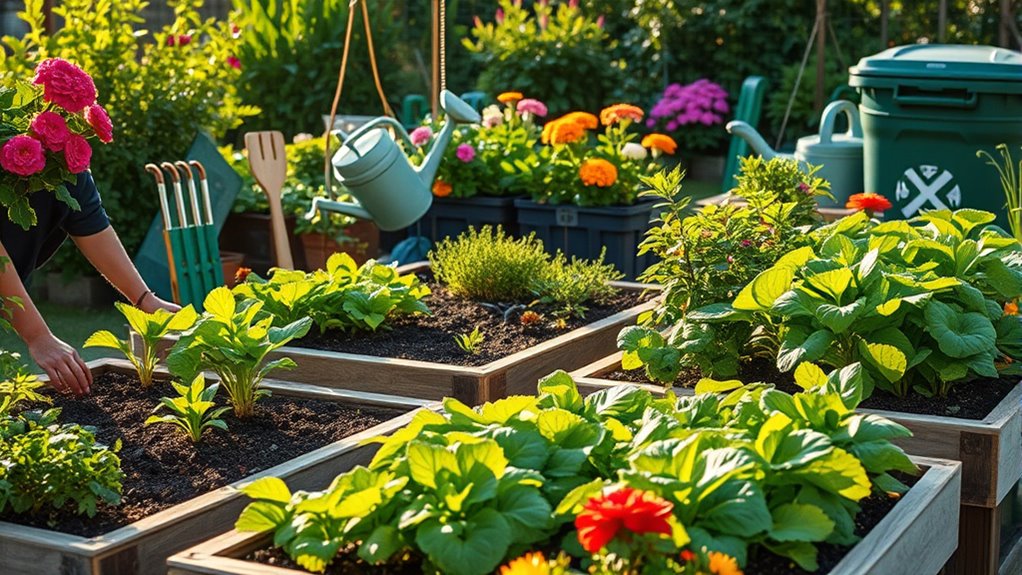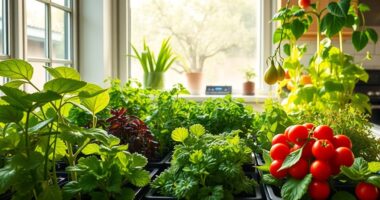Gardening for wellness allows you to connect with nature, which can boost your mood and reduce stress. By tending to your garden, you get physical activity and natural sunlight that improve your physical and mental health. Growing your own plants promotes a sustainable lifestyle, supporting soil health, reducing chemicals, and helping the environment. As you nurture your garden, you’ll gain confidence and a sense of accomplishment. Keep exploring to discover more ways gardening can enhance your overall well-being.
Key Takeaways
- Gardening reduces stress and boosts mood through physical activity and connection with nature.
- Healthy soil management enhances plant growth, promotes sustainability, and decreases reliance on chemicals.
- Outdoor gardening increases natural light exposure, improving vitamin D levels and regulating sleep.
- Engaging with gardens fosters confidence, sense of achievement, and mental well-being.
- Urban gardening creates eco-friendly green spaces that improve environmental health and promote mindful living.

Have you ever noticed how tending to a garden can lift your mood and reduce stress? Whether you have a sprawling backyard or just a small balcony, urban gardening offers a rewarding way to connect with nature and improve your well-being. By cultivating plants in city environments, you create a green oasis that provides more than just visual pleasure. It’s a form of therapy that boosts mental health and encourages a more sustainable lifestyle. One of the key aspects of successful urban gardening is understanding soil health. Healthy soil acts as the foundation for vibrant plants, and maintaining it is essential for both your garden’s productivity and your personal health. When you pay attention to soil health, you ensure your plants receive the nutrients they need to thrive, which in turn benefits your overall wellness.
Healthy soil is the foundation of a thriving garden and your well-being.
Urban gardening often involves working with limited space, so you learn inventive ways to maximize your soil’s potential. This might mean composting kitchen scraps to create rich organic matter or using raised beds with carefully selected soil mixes. These practices help improve soil aeration and moisture retention, making your garden more resilient and easier to manage. The act of enriching soil isn’t just good for your plants; it’s also a mindful process that grounds you in the present moment. As you mix compost, loosen soil, and monitor its health, you develop a deeper appreciation for the natural processes that sustain life. This connection to soil fosters a sense of responsibility and satisfaction, reinforcing your commitment to sustainability. Additionally, understanding the importance of soil health can help prevent plant diseases and improve crop yields, making your gardening efforts more effective.
Furthermore, focusing on soil health reduces the need for chemical fertilizers and pesticides, aligning your gardening efforts with eco-friendly principles. You’re actively contributing to a healthier environment while nurturing your own well-being. The physical activity involved in urban gardening — digging, planting, watering — releases endorphins that elevate your mood and combat feelings of anxiety. Plus, spending time outdoors exposes you to natural light, which helps regulate your sleep and boosts your vitamin D levels. As your garden flourishes, so does your confidence and sense of accomplishment. Watching your plants grow and thrive because of your care creates a positive feedback loop that encourages you to keep going and adopt a more sustainable lifestyle.
In essence, urban gardening isn’t just about growing food or flowers; it’s about cultivating a healthier, more balanced life. By focusing on soil health and engaging with your environment intentionally, you’re making a meaningful investment in your mental, physical, and environmental wellness. The simple act of tending to your garden becomes a powerful tool for reducing stress, enhancing your mood, and fostering a harmonious relationship with nature. In the chaos of city life, your garden becomes a sanctuary where wellness and sustainability grow hand in hand. Recognizing the importance of soil health empowers you to create a thriving garden that benefits both your health and the environment.
Frequently Asked Questions
How Does Gardening Improve Mental Health Long-Term?
Gardening improves your long-term mental health by fostering mindfulness practices, helping you stay present and reduce stress. As you nurture plants, you build emotional resilience, learning patience and coping skills. Regular gardening creates a calming routine, combats anxiety, and boosts your mood over time. It’s a natural way to strengthen mental well-being, making you more resilient to life’s challenges while enjoying the therapeutic benefits of connecting with nature.
What Are the Best Sustainable Plants for Beginner Gardeners?
When choosing sustainable plants for beginners, focus on native species and drought-tolerant plants. These are easier to care for because they’re adapted to your local climate and need less water. You’ll find them resilient and low-maintenance, making your gardening experience more successful. Start with options like lavender, succulents, or native grasses. They thrive with minimal effort, helping you build confidence while supporting a sustainable, eco-friendly garden.
Can Urban Gardening Contribute to Community Wellness?
Urban gardening can substantially boost community wellness by creating vibrant community green spaces and promoting urban food production. When you cultivate these spaces, you’re encouraging social interaction, reducing stress, and improving mental health. Plus, growing fresh, local produce fosters healthier eating habits. As a result, your efforts help build stronger, more connected neighborhoods, making urban environments more sustainable and enjoyable for everyone.
How Does Composting Support a Sustainable Gardening Lifestyle?
Think of composting as turning your kitchen scraps into treasure for your garden. It enriches your soil, making it a lush, fertile bed that supports healthy plants. By composting, you’re also cutting down waste, preventing it from piling up in landfills. This cycle of waste reduction and soil enrichment creates a sustainable gardening lifestyle, transforming everyday waste into a powerful tool for nurturing your green space and supporting the planet.
What Are Eco-Friendly Pest Control Methods for Gardens?
You can control pests eco-friendly by encouraging natural predators like ladybugs and lacewings to thrive in your garden. Additionally, make homemade repellents using ingredients like garlic, neem oil, or chili peppers to deter harmful insects. These methods reduce chemical use, protect beneficial insects, and promote a healthier, more sustainable garden environment, aligning with eco-friendly practices and supporting your overall wellness.
Conclusion
By embracing gardening, you not only nurture plants but also boost your mental and physical health. Some experts believe that connecting with nature can lower stress hormones and even strengthen your immune system. So, next time you dig into the soil, remember you’re doing more than cultivating a garden—you’re cultivating wellness. Science suggests that this sustainable lifestyle could be a powerful, natural way to improve your overall wellbeing, making every moment in your garden a step toward better health.









